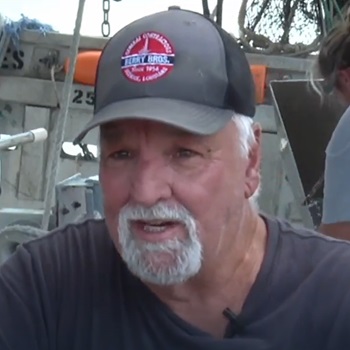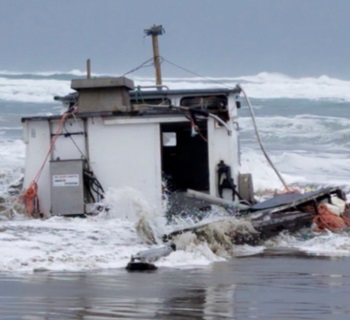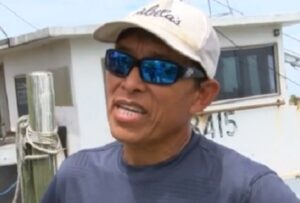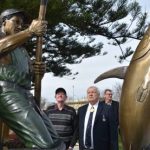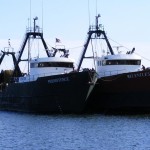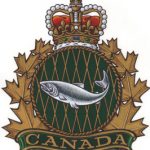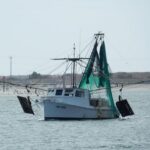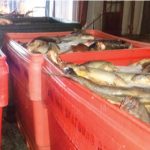Category Archives: South Atlantic
He left a legacy in SC’s shrimping industry. Soon, he’ll be memorialized in Mount Pleasant.
 In an upstairs sculpture studio in Charleston’s sister city, Tressy Mellichamp saw her father again. Captain Edwin “Wayne” Magwood’s likeness stood tall in Susie Chisholm’s home studio. Chisholm has spent weeks skillfully carving Magwood’s features into the earth-toned material, piling the oil-based clay onto a 3D printed foam base and molding it into what now resembles the late fisherman. Videos, photos and stories from family members help guide Chishom’s impression of Magwood. He had a lot of character in his features, crinkles around his eyes, a playful smile and short, fat fingers that clearly belonged to a man who spent much of his life working with his hands — in Magwood’s case, on the water, trawling for shrimp. Video, photos, more, >>CLICK TO READ<< 09:22
In an upstairs sculpture studio in Charleston’s sister city, Tressy Mellichamp saw her father again. Captain Edwin “Wayne” Magwood’s likeness stood tall in Susie Chisholm’s home studio. Chisholm has spent weeks skillfully carving Magwood’s features into the earth-toned material, piling the oil-based clay onto a 3D printed foam base and molding it into what now resembles the late fisherman. Videos, photos and stories from family members help guide Chishom’s impression of Magwood. He had a lot of character in his features, crinkles around his eyes, a playful smile and short, fat fingers that clearly belonged to a man who spent much of his life working with his hands — in Magwood’s case, on the water, trawling for shrimp. Video, photos, more, >>CLICK TO READ<< 09:22
U.S. Offshore Wind Opponents Seek to Form National Group to Fight Projects
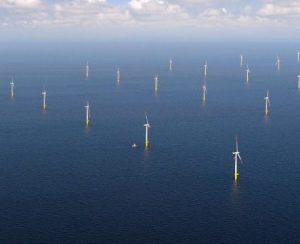 U.S. activists opposed to offshore wind development are forming a national coalition aimed at fighting projects from California to New England, according to the effort’s founder and two other organizations. The National Offshore-wind Opposition Alliance, or NOOA, aims to bring a national profile to what is currently a fractured movement of dozens of local groups, according to its president, Mandy Davis. Offshore wind is a nascent industry in the United States and a key pillar of U.S. President Joe Biden’s plan to combat climate change. His administration’s push to install turbines along every U.S. coastline has attracted pushback, including multiple lawsuits, from residents concerned about the industry’s impact on tourism, property values, fishing and marine habitats. more, >>CLICK TO READ<< 08:25
U.S. activists opposed to offshore wind development are forming a national coalition aimed at fighting projects from California to New England, according to the effort’s founder and two other organizations. The National Offshore-wind Opposition Alliance, or NOOA, aims to bring a national profile to what is currently a fractured movement of dozens of local groups, according to its president, Mandy Davis. Offshore wind is a nascent industry in the United States and a key pillar of U.S. President Joe Biden’s plan to combat climate change. His administration’s push to install turbines along every U.S. coastline has attracted pushback, including multiple lawsuits, from residents concerned about the industry’s impact on tourism, property values, fishing and marine habitats. more, >>CLICK TO READ<< 08:25
Hurricane Debby makes landfall in Florida as Cat 1 storm.
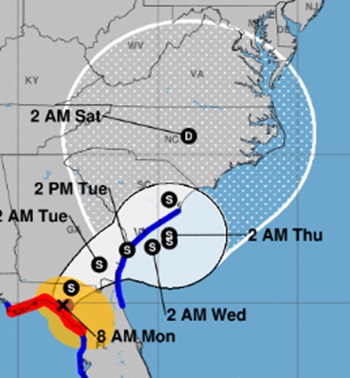 Hurricane Debby made landfall near Steinhatchee, Florida in the Florida Big Bend area as a Category 1 hurricane around 7 a.m. Monday. Sustained winds were 80 mph, making Debby a Category 1 hurricane at the time of landfall. Landfall came less than 12 hours after Debby strengthened from a tropical storm into a hurricane Although winds had already dropped to 75 mph by 8 a.m., forecasters warned life-threatening storm surge and “potentially catastrophic rainfall” are expected before Debby finishes with Florida and as it heads toward Georgia and the Carolinas. Debby is expected to bring 6 to 12 inches of rain to Florida, with some areas seeing up to 18 inches, according to the National Hurricane Center. Video, photos, more, >>CLICK TO READ<< 10:37
Hurricane Debby made landfall near Steinhatchee, Florida in the Florida Big Bend area as a Category 1 hurricane around 7 a.m. Monday. Sustained winds were 80 mph, making Debby a Category 1 hurricane at the time of landfall. Landfall came less than 12 hours after Debby strengthened from a tropical storm into a hurricane Although winds had already dropped to 75 mph by 8 a.m., forecasters warned life-threatening storm surge and “potentially catastrophic rainfall” are expected before Debby finishes with Florida and as it heads toward Georgia and the Carolinas. Debby is expected to bring 6 to 12 inches of rain to Florida, with some areas seeing up to 18 inches, according to the National Hurricane Center. Video, photos, more, >>CLICK TO READ<< 10:37
UPDATE: Tropical Storm Debby to Bring Major Flooding to Southeast After Florida Landfall
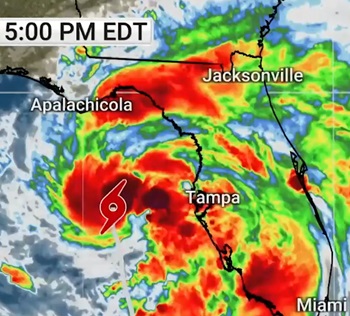 Tropical Storm Debby could bring historically heavy rainfall, gusty winds and a few tornadoes, from north Florida to coastal South Carolina after making landfall in Florida’s Big Bend region Monday. Flash flooding is the number one concern with Debby. NOAA has issued their highest level of flood outlook for both Monday and Tuesday, shown in pink on the maps below. These areas will likely experience damaging flooding and could experience life-threatening flooding. Debby will also bring gusty winds, coastal flooding and a few tornadoes across the Florida Peninsula Sunday and then along the Southeast coast early in the coming week, where it could slow down or even stall, prolonging impacts. Here’s where watches and warnings are in effect: A hurricane warning is in effect for the Florida Big Bend region from the Suwannee River to Indian Pass. more, >>CLICK TO READ<< 19:56
Tropical Storm Debby could bring historically heavy rainfall, gusty winds and a few tornadoes, from north Florida to coastal South Carolina after making landfall in Florida’s Big Bend region Monday. Flash flooding is the number one concern with Debby. NOAA has issued their highest level of flood outlook for both Monday and Tuesday, shown in pink on the maps below. These areas will likely experience damaging flooding and could experience life-threatening flooding. Debby will also bring gusty winds, coastal flooding and a few tornadoes across the Florida Peninsula Sunday and then along the Southeast coast early in the coming week, where it could slow down or even stall, prolonging impacts. Here’s where watches and warnings are in effect: A hurricane warning is in effect for the Florida Big Bend region from the Suwannee River to Indian Pass. more, >>CLICK TO READ<< 19:56
Tropical Storm Debby timeline: When could it become hurricane, make landfall?
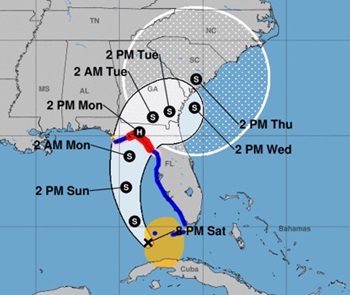 Tropical Storm Debby officially formed Saturday afternoon, making it the fourth named storm of the 2024 Atlantic hurricane season, according to the National Hurricane Center. Forecasters believe Tropical Storm Debby could be ‘at or near hurricane’ strength as it approaches the Florida coast before landfall, according to the 5 p.m. advisory. A timeline has been established for when the eye of what is now known as Tropical Storm Debby could impact Florida over the weekend and into early next week. On Saturday, the NHC issued a hurricane watch and warning for portions of Florida’s Gulf Coast. more, >>CLICK TO READ<< 07:32
Tropical Storm Debby officially formed Saturday afternoon, making it the fourth named storm of the 2024 Atlantic hurricane season, according to the National Hurricane Center. Forecasters believe Tropical Storm Debby could be ‘at or near hurricane’ strength as it approaches the Florida coast before landfall, according to the 5 p.m. advisory. A timeline has been established for when the eye of what is now known as Tropical Storm Debby could impact Florida over the weekend and into early next week. On Saturday, the NHC issued a hurricane watch and warning for portions of Florida’s Gulf Coast. more, >>CLICK TO READ<< 07:32
Unalaska, Aleutians East Borough oppose Rep. Peltola’s proposed trawling limitations
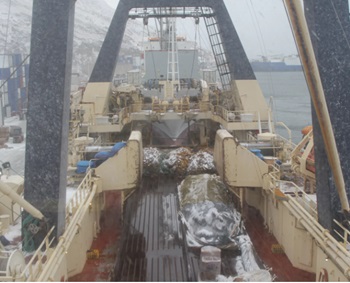 Communities in the Aleutians are pushing back against proposed legislation that would bring stricter regulations to the Bering Sea trawl fishery. The City of Unalaska and the Aleutians East Borough are among 53 organizations that signed onto a letter sent to U.S. Rep. Mary Peltola, urging her to withdraw H.R. 8507, a bill she sponsored in May. The proposed legislation aims to add new regulations to where trawling can take place across the United States, not only in Alaska. Trade organizations and some coastal communities whose economies rely on trawl fisheries have pushed back against the bill, asking the congresswoman to repeal it. “If enacted, H.R. 8507 would directly harm fishermen and coastal communities in Alaska and throughout our nation, along with countless other people who rely on a healthy domestic seafood sector for food, jobs, and their way of life,” the letter said. more, >>CLICK TO READ<< 13:28
Communities in the Aleutians are pushing back against proposed legislation that would bring stricter regulations to the Bering Sea trawl fishery. The City of Unalaska and the Aleutians East Borough are among 53 organizations that signed onto a letter sent to U.S. Rep. Mary Peltola, urging her to withdraw H.R. 8507, a bill she sponsored in May. The proposed legislation aims to add new regulations to where trawling can take place across the United States, not only in Alaska. Trade organizations and some coastal communities whose economies rely on trawl fisheries have pushed back against the bill, asking the congresswoman to repeal it. “If enacted, H.R. 8507 would directly harm fishermen and coastal communities in Alaska and throughout our nation, along with countless other people who rely on a healthy domestic seafood sector for food, jobs, and their way of life,” the letter said. more, >>CLICK TO READ<< 13:28
Rough Weather Conditions Forces Stop on Search for Missing Crew
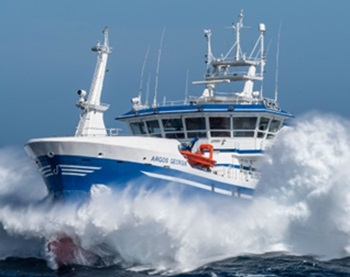 The Falkland Islands Government has called off the search for the remaining crew members of the fishing vessel Argos Georgia, which was reported to be taking on water and requesting assistance 200 miles east of Stanley on Monday, 22 July 2024. The crew abandoned the vessel at 4pm local time on the same day. Since then, the Falkland Islands Government, along with the Government of South Georgia and the South Sandwich Islands, HQ British Forces South Atlantic Islands, the UK Maritime & Coastguard Agency, the fishing vessel company, and other fishing vessels in the vicinity, have been working tirelessly on a rescue mission. more, >>CLICK TO READ<< 06:59
The Falkland Islands Government has called off the search for the remaining crew members of the fishing vessel Argos Georgia, which was reported to be taking on water and requesting assistance 200 miles east of Stanley on Monday, 22 July 2024. The crew abandoned the vessel at 4pm local time on the same day. Since then, the Falkland Islands Government, along with the Government of South Georgia and the South Sandwich Islands, HQ British Forces South Atlantic Islands, the UK Maritime & Coastguard Agency, the fishing vessel company, and other fishing vessels in the vicinity, have been working tirelessly on a rescue mission. more, >>CLICK TO READ<< 06:59
The Offshore Wind Energy Scandal Is Even Worse Than You Think
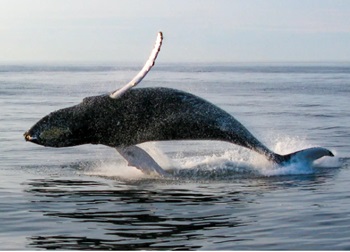 These 11 charts show how America’s biggest NGOs are colluding with foreign corporations that want to industrialize our oceans with thousands of turbines that will hurt whales and ratepayers Two of Europe’s biggest energy companies are abandoning the SS Offshore Wind. In May, Shell, the UK-based oil and gas giant (2023 revenue: $317 billion), announced that it was cutting staff from its offshore wind business because, according to Bloomberg, the company has decided to focus on markets that “deliver the most value for our investors and customers.” Bloomberg also reported that the staff cuts were made after the departures of top executives in the company’s offshore wind and renewable power businesses. Lots of informative grafs. more, >>CLICK TO READ<< 09:29
These 11 charts show how America’s biggest NGOs are colluding with foreign corporations that want to industrialize our oceans with thousands of turbines that will hurt whales and ratepayers Two of Europe’s biggest energy companies are abandoning the SS Offshore Wind. In May, Shell, the UK-based oil and gas giant (2023 revenue: $317 billion), announced that it was cutting staff from its offshore wind business because, according to Bloomberg, the company has decided to focus on markets that “deliver the most value for our investors and customers.” Bloomberg also reported that the staff cuts were made after the departures of top executives in the company’s offshore wind and renewable power businesses. Lots of informative grafs. more, >>CLICK TO READ<< 09:29
Shrimp season reopens in the Gulf of Mexico, Aransas Pass fleet heads that way
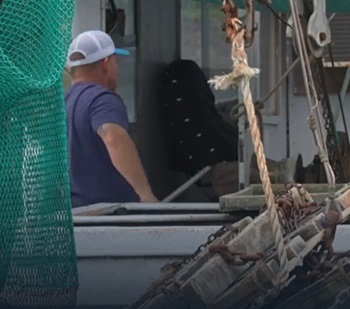 Shrimp season is back in full swing at Conn Brown Harbor now that state and federal waters have reopened to commercial shrimping. It’s a busy time for shrimpers after being closed for over two months. “Boats are coming out of Palacios, Aransas Pass, Brownsville, Galveston. All the different ports,” Aransas Pass local Cecil Robles said. An armada of shrimp boats is off to the Gulf of Mexico, hoping to fill their nets with tiny treasures. Robles works at Conn Brown Harbor, where he fuels shrimp boats for Erickson and Jensen seafood packers. “The next few days, we’ll start to hear from them about what they’re catching and how abundant the fish are,” Robles said. Video, more, >>CLICK TO READ<< 10:59
Shrimp season is back in full swing at Conn Brown Harbor now that state and federal waters have reopened to commercial shrimping. It’s a busy time for shrimpers after being closed for over two months. “Boats are coming out of Palacios, Aransas Pass, Brownsville, Galveston. All the different ports,” Aransas Pass local Cecil Robles said. An armada of shrimp boats is off to the Gulf of Mexico, hoping to fill their nets with tiny treasures. Robles works at Conn Brown Harbor, where he fuels shrimp boats for Erickson and Jensen seafood packers. “The next few days, we’ll start to hear from them about what they’re catching and how abundant the fish are,” Robles said. Video, more, >>CLICK TO READ<< 10:59
Athearn Marine Agency Boat of the Week: 78′ Steel Shrimp Trawler, Caterpillar 3412TA Diesel
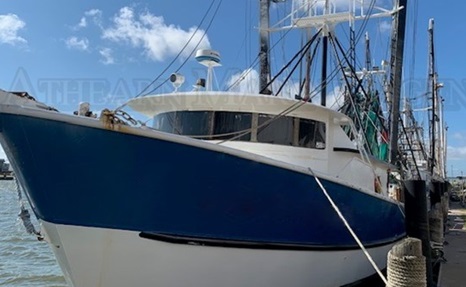 To review specifications, information, and 18 photos’, >click here< To see all the boats in this series, >click here< 07:12
To review specifications, information, and 18 photos’, >click here< To see all the boats in this series, >click here< 07:12
Local shrimpers set to rally this weekend to raise awareness against imports
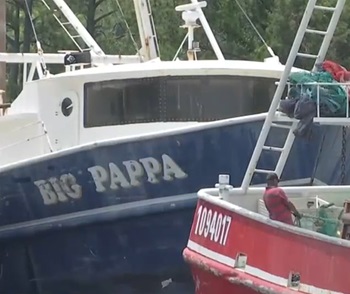 Kerry Mitchell and her husband know the challenges that come with shrimping for a living. Her husband Michael is out dragging his net off Dauphin Island. The couple owns “Salty Pirates Seafood” — and will tell you — the money is not like it used to be — mainly due to the U.S. market being flooded with shrimp from overseas. “We don’t have a level playing field. Even the government is financially supporting it,” said Kerry. The Save Our Shrimpers Act, a federal bill introduced in April of this year aims to stop that. The rally is this Saturday at the “Shrimp Lady” restaurant in Satsuma (5523 Highway 43) from 4 p.m. to 7 p.m. They’ll be local shrimpers, live music — as well as boiled Gulf Coast shrimp for those in attendance. Video, more, >>CLICK TO READ<< 14:29
Kerry Mitchell and her husband know the challenges that come with shrimping for a living. Her husband Michael is out dragging his net off Dauphin Island. The couple owns “Salty Pirates Seafood” — and will tell you — the money is not like it used to be — mainly due to the U.S. market being flooded with shrimp from overseas. “We don’t have a level playing field. Even the government is financially supporting it,” said Kerry. The Save Our Shrimpers Act, a federal bill introduced in April of this year aims to stop that. The rally is this Saturday at the “Shrimp Lady” restaurant in Satsuma (5523 Highway 43) from 4 p.m. to 7 p.m. They’ll be local shrimpers, live music — as well as boiled Gulf Coast shrimp for those in attendance. Video, more, >>CLICK TO READ<< 14:29
Shrimpers on the Coast struggling as season continues
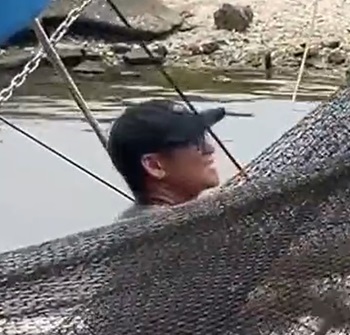 Shrimpers on the Coast say this season hasn’t been too good to them. Quality Seafood in Biloxi says it’s hard to get fresh shrimp right now because there aren’t many fishermen at the docks selling. Manager Troy Rosetti said they’ve had to go to Louisiana and Alabama to get most of the shrimp that they have. “Kind of a falling out, we don’t have as many boats and shrimpers as we used to,” Rosetti said. “We have plenty of shrimp. It’s not a shortage here at our place. It just makes it a lot harder for us to get them.” Chris Lyons is a dock manager in Biloxi who said this shrimp season has been worse than in 2023. Video, more, >>CLICK TO READ<< 10:19
Shrimpers on the Coast say this season hasn’t been too good to them. Quality Seafood in Biloxi says it’s hard to get fresh shrimp right now because there aren’t many fishermen at the docks selling. Manager Troy Rosetti said they’ve had to go to Louisiana and Alabama to get most of the shrimp that they have. “Kind of a falling out, we don’t have as many boats and shrimpers as we used to,” Rosetti said. “We have plenty of shrimp. It’s not a shortage here at our place. It just makes it a lot harder for us to get them.” Chris Lyons is a dock manager in Biloxi who said this shrimp season has been worse than in 2023. Video, more, >>CLICK TO READ<< 10:19
Gulf of Mexico Shrimp Fishery to Re-Open Off Texas on July 15, 2024
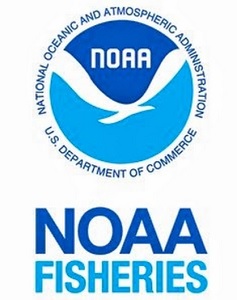 NOAA Fisheries announces federal waters from 9 to 200 nautical miles off Texas will open to shrimp trawling beginning 30 minutes after official sunset, local time, on July 15, 2024, corresponding to the time Texas opens its waters to shrimp trawling. The waters off Texas are closed to shrimp fishing annually to allow brown shrimp to reach a larger and more valuable size prior to harvest, and to prevent waste of brown shrimp that might otherwise be discarded because of their small size. The fishery closed on May 15, 2024. The re-opening date for Texas waters is based on the results of biological sampling by the Texas Parks and Wildlife Department and the assessment of maximum tidal durations. In addition, Texas regulations only allow a 60-day closure; the 60-day period expires July 15, 2024. more, >>CLICK TO READ<< 09:47
NOAA Fisheries announces federal waters from 9 to 200 nautical miles off Texas will open to shrimp trawling beginning 30 minutes after official sunset, local time, on July 15, 2024, corresponding to the time Texas opens its waters to shrimp trawling. The waters off Texas are closed to shrimp fishing annually to allow brown shrimp to reach a larger and more valuable size prior to harvest, and to prevent waste of brown shrimp that might otherwise be discarded because of their small size. The fishery closed on May 15, 2024. The re-opening date for Texas waters is based on the results of biological sampling by the Texas Parks and Wildlife Department and the assessment of maximum tidal durations. In addition, Texas regulations only allow a 60-day closure; the 60-day period expires July 15, 2024. more, >>CLICK TO READ<< 09:47
This Florida fisherman worries about the industry’s future
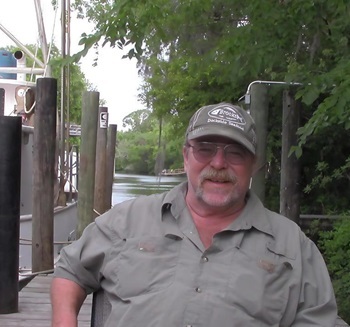 Commercial fishing is vital to Florida’s culture and identity. Today, Florida fishermen like me land $209 million worth of fish and shellfish in dock-side value alone. The economic impact of the commercial fishing industry ripples up the supply chain generating $8.7 billion. Hundreds of millions of tourists travel to Florida to enjoy fresh seafood in the Sunshine State. The National Marine Fisheries Service (NMFS) “Status of the Stocks” report that was recently released would have you believe that everything is rosy. But let me tell you what’s really happening – what you don’t see in that federal report – from the perspective and experience of someone who makes a living on the water in the Gulf of Mexico. more, >>CLICK TO READ<< 07:29
Commercial fishing is vital to Florida’s culture and identity. Today, Florida fishermen like me land $209 million worth of fish and shellfish in dock-side value alone. The economic impact of the commercial fishing industry ripples up the supply chain generating $8.7 billion. Hundreds of millions of tourists travel to Florida to enjoy fresh seafood in the Sunshine State. The National Marine Fisheries Service (NMFS) “Status of the Stocks” report that was recently released would have you believe that everything is rosy. But let me tell you what’s really happening – what you don’t see in that federal report – from the perspective and experience of someone who makes a living on the water in the Gulf of Mexico. more, >>CLICK TO READ<< 07:29
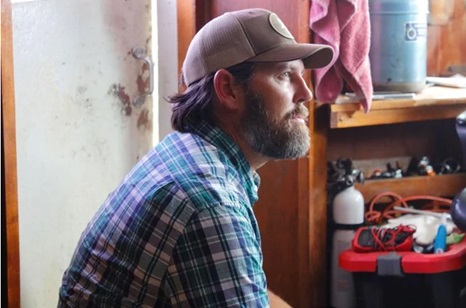
Wake Up Call Aboard The Pamela Sue
Carolina Seafood sits on Jeremy Creek, a creek named after King Jeremy, a Seewee Indian chief whose tribe lived along the creek’s banks. There I met Capt. Bryan Jones. He catches shrimp, no easy task. Besides the hard and dangerous work, he must overcome many a challenge. Capt. Jones showed me around his boat, Pamela Sue. Making our way through and past an assemblage of ropes, pulleys, nets, chains, and cables I filed a mental note. “Never bring a tripod onto a shrimp boat’s deck.” The chance of snagging something dangerous is great. Capt. Jones and I sat in the wheelhouse of his 1958 boat. As he discussed shrimping’s challenges, I looked around. I noticed bunk beds right away. Shrimpers sleep in their floating office, their home away from home. I saw too a small galley and a handsome wooden wheel caught my eye. And something else. An array of sophisticated electronics that navigate and portray bottom conditions and more. more, >>CLICK TO READ<< 10:33
U.S. fisheries could be devastated by Supreme Court’s ending the Chevron doctrine
 Loper Bright Enterprises v. Raimondo the Supreme Court’s late June decision on regulatory agency authority, heralds the much-anticipated end of the 40-year-old Chevron doctrine, which required courts to defer to federal agencies when interpreting laws. No doubt, much will be written in the coming weeks about the impacts of Chevron’s demise on the administrative state. But, at its core, Loper Bright is a case about fisheries. What then are the implications of this decision for both the fishermen and the healthy fisheries of the United States? This case comes at a critical time for U.S. fisheries. Historically, the U.S. has seen many notable economically and culturally ruinous fisheries collapse — from the Atlantic cod collapse of the 1990s to the current collapse of Pacific salmon. The Magnuson-Stevens Act created the framework for the protection of U.S. fisheries and has been moderately successful since its enactment. more, >>CLICK TO READ<< 09:21
Loper Bright Enterprises v. Raimondo the Supreme Court’s late June decision on regulatory agency authority, heralds the much-anticipated end of the 40-year-old Chevron doctrine, which required courts to defer to federal agencies when interpreting laws. No doubt, much will be written in the coming weeks about the impacts of Chevron’s demise on the administrative state. But, at its core, Loper Bright is a case about fisheries. What then are the implications of this decision for both the fishermen and the healthy fisheries of the United States? This case comes at a critical time for U.S. fisheries. Historically, the U.S. has seen many notable economically and culturally ruinous fisheries collapse — from the Atlantic cod collapse of the 1990s to the current collapse of Pacific salmon. The Magnuson-Stevens Act created the framework for the protection of U.S. fisheries and has been moderately successful since its enactment. more, >>CLICK TO READ<< 09:21
Federal fishing monitoring program needs overhaul, GAO says
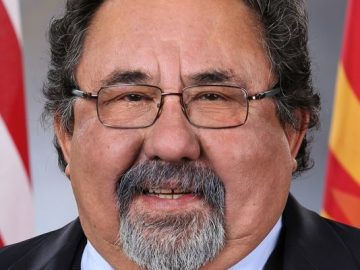 Only days after the Supreme Court dealt a blow to the federal government’s program placing human observers on commercial fishing boats, a federal watchdog said NOAA Fisheries should do a better job monitoring the industry. A report released Wednesday by the Government Accountability Office said NOAA Fisheries — also known as the National Marine Fisheries Service — has failed to execute its program as Congress intended under law. “NMFS’ efforts to track its performance in reducing and monitoring bycatch do not align with key elements of evidence-based policymaking related to performance management,” GAO said in the report, which was requested by Rep. Raúl Grijalva (D-Ariz.), the ranking member of the House Natural Resources Committee. more, >>CLICK TO READ<< 19:19
Only days after the Supreme Court dealt a blow to the federal government’s program placing human observers on commercial fishing boats, a federal watchdog said NOAA Fisheries should do a better job monitoring the industry. A report released Wednesday by the Government Accountability Office said NOAA Fisheries — also known as the National Marine Fisheries Service — has failed to execute its program as Congress intended under law. “NMFS’ efforts to track its performance in reducing and monitoring bycatch do not align with key elements of evidence-based policymaking related to performance management,” GAO said in the report, which was requested by Rep. Raúl Grijalva (D-Ariz.), the ranking member of the House Natural Resources Committee. more, >>CLICK TO READ<< 19:19
Shrimp Trade Action
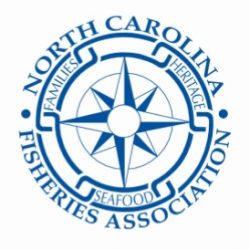 For several months, shrimpers, packers and dealers have been working on trade action which is a new anti-dumping investigation of frozen warm water shrimp from Ecuador, India, Indonesia and Vietnam. Those working on this are from the states of North Carolina thru Texas. This next stage requires those involved in the fishery to fill out questionnaires which needs to be submitted to the International Trade Commission before July 26, 2024. This ITC investigation is being carried out to determine if unfair trade practices by other countries importing shrimp to the U.S have caused harm to our domestic shrimpers and if higher tariffs are necessary. In order to show harm, the domestic industry MUST FILL OUT THE QUESTIONNAIRE ACCURATELY AND SUBMIT IT TO THE ITC BY JULY 26th!!!! more, >>CLICK TO READ<< 06:44
For several months, shrimpers, packers and dealers have been working on trade action which is a new anti-dumping investigation of frozen warm water shrimp from Ecuador, India, Indonesia and Vietnam. Those working on this are from the states of North Carolina thru Texas. This next stage requires those involved in the fishery to fill out questionnaires which needs to be submitted to the International Trade Commission before July 26, 2024. This ITC investigation is being carried out to determine if unfair trade practices by other countries importing shrimp to the U.S have caused harm to our domestic shrimpers and if higher tariffs are necessary. In order to show harm, the domestic industry MUST FILL OUT THE QUESTIONNAIRE ACCURATELY AND SUBMIT IT TO THE ITC BY JULY 26th!!!! more, >>CLICK TO READ<< 06:44
How the Supreme Court rescued my NJ fishing firm that bureaucrats almost sank
 The Supreme Court just sided with my New Jersey-based, family-owned fishing business, and may have even saved it. That’s the reality of the court’s June 28 decision in a case called Loper Bright Enterprises v. Raimondo, which overturned the “Chevron doctrine” that gave unchecked power to federal bureaucrats. Yet the media reaction hasn’t focused on what the ruling means for regular people and job creators like me. The pundits say that Washington, DC, will descend into chaos because the justices stopped unelected and unaccountable bureaucrats from deciding for themselves what’s “reasonable” under federal law. But as I can attest, that power quickly leads to abuse. The Supreme Court has protected the American people from regulators run amok, and from a Congress that won’t do its job. I was one of the small business owners who sued the federal government in this case. By Wayne Reichle, more, >>CLICK TO READ<< 21:20
The Supreme Court just sided with my New Jersey-based, family-owned fishing business, and may have even saved it. That’s the reality of the court’s June 28 decision in a case called Loper Bright Enterprises v. Raimondo, which overturned the “Chevron doctrine” that gave unchecked power to federal bureaucrats. Yet the media reaction hasn’t focused on what the ruling means for regular people and job creators like me. The pundits say that Washington, DC, will descend into chaos because the justices stopped unelected and unaccountable bureaucrats from deciding for themselves what’s “reasonable” under federal law. But as I can attest, that power quickly leads to abuse. The Supreme Court has protected the American people from regulators run amok, and from a Congress that won’t do its job. I was one of the small business owners who sued the federal government in this case. By Wayne Reichle, more, >>CLICK TO READ<< 21:20

An Optimist’s view: Death of the Chevron Deference
My name is David Goethel. I am a 55 year plus commercial fisherman, research biologist and former fishery manager. As author of Endangered Species/Chronicles of A new England Fisherman I discuss these topics and a lawsuit I filed in 2015 with the legal group Cause of Action over the legal concept known as Chevron Deference. Most people believe Congress writes laws, the Executive Branch carries out those laws and the Judicial Branch interprets and clarifies whether aspects of those laws are Constitutional and correctly applied. It turns out under a doctrine called “Chevron Deference” the regulatory bureaucracy can deem a law unclear or ambiguous and create any regulation the agency decides it needs to carry out its bureaucratic function. Until this past Friday, the courts gave deference to the regulators as the “recognized experts” even though no proof is required and no test for ambiguity is applied. The Supreme Court overturned Chevron Friday saying they had “placed a tombstone on its grave”. Fishermen, including me, had sued saying that unelected regulators should not have this vast power over our lives. more, >>CLICK TO READ<< 20:18
Fishermen Who Were Forced to Pay $700 Per Day to Government-Mandated Observers on Their Boats Get Big News from SCOTUS
 Members of the 18th-century British Parliament, unelected by American colonists, tried to take money from those colonists without their consent. Hence, the American Revolution ensued. On Friday, the U.S. Supreme Court overturned a 40-year-old ruling that had allowed unelected federal regulators, acting the part of the British Parliament, to commit such travesties of justice as requiring fishermen to pay for government-mandated regulators on their boats — a requirement that, according to CBS, could cost the fishermen more than $700 per day. The true magnitude of Friday’s ruling, however, involved far more than fishing boats. In fact, it struck at the heart of American progressivism by eviscerating the insidious claim that federal “experts” know best. In so doing, it took one small-but-crucial step towards dismantling the permanent federal state that actually governs in Washington, D.C. more, >>CLICK TO READ<< 11:18
Members of the 18th-century British Parliament, unelected by American colonists, tried to take money from those colonists without their consent. Hence, the American Revolution ensued. On Friday, the U.S. Supreme Court overturned a 40-year-old ruling that had allowed unelected federal regulators, acting the part of the British Parliament, to commit such travesties of justice as requiring fishermen to pay for government-mandated regulators on their boats — a requirement that, according to CBS, could cost the fishermen more than $700 per day. The true magnitude of Friday’s ruling, however, involved far more than fishing boats. In fact, it struck at the heart of American progressivism by eviscerating the insidious claim that federal “experts” know best. In so doing, it took one small-but-crucial step towards dismantling the permanent federal state that actually governs in Washington, D.C. more, >>CLICK TO READ<< 11:18
Opinion: The Fisheries Act is crucial to speed disaster relief to American fisheries
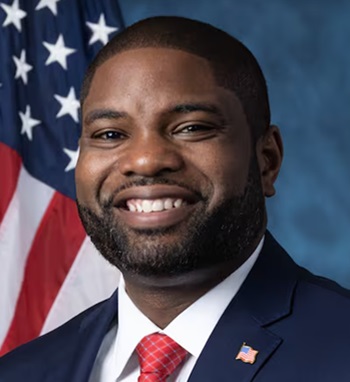 By the time NOAA and OMB finally approve and allocate disaster relief, small businesses and fisheries are already devastated and, in some cases, may have already been forced to close shop. This self-induced, slow-moving bureaucratic process is unacceptable. Overall, the Fishes Act expedites the deployment of federal fishery disaster relief by cutting unnecessary red tape and enacting a 30-day decision requirement for the Office of Management and Budget to either deny or approve a state’s spending plan. What we hope to do with this bill is to throw American fisheries and coastal communities a life raft to stay afloat post-disaster. U.S. fisheries support millions of jobs and bring in billions of dollars to the broader U.S. economy each year. more, >>CLICK TO READ<< 10:17
By the time NOAA and OMB finally approve and allocate disaster relief, small businesses and fisheries are already devastated and, in some cases, may have already been forced to close shop. This self-induced, slow-moving bureaucratic process is unacceptable. Overall, the Fishes Act expedites the deployment of federal fishery disaster relief by cutting unnecessary red tape and enacting a 30-day decision requirement for the Office of Management and Budget to either deny or approve a state’s spending plan. What we hope to do with this bill is to throw American fisheries and coastal communities a life raft to stay afloat post-disaster. U.S. fisheries support millions of jobs and bring in billions of dollars to the broader U.S. economy each year. more, >>CLICK TO READ<< 10:17
Agreement reached in fishermen’s suit against Golden Ray
 Federal lawsuits filed by commercial fishermen and charter fishing captains against the owners and operators of the Golden Ray were dismissed after an agreement was reached by all sides. A joint stipulation of dismissal filed Tuesday in the U.S. District Court’s Southern District of Georgia said the “parties have resolved this litigation.” Terms of the agreement were not disclosed. The Golden Ray capsized on its port side in the early hours of Sept. 8, 2019, while heading to sea with 4,161 vehicles and an estimated 380,000 of fuel in its tanks. Shrimpers like Johnny Bennett, captain of the Dora F, told The News in September 2022, when the lawsuit was filed, that he and his peers had been pulling up car bumpers and other parts from the water in their nets after the shipwreck. more, >>CLICK TO READ<< 06:17
Federal lawsuits filed by commercial fishermen and charter fishing captains against the owners and operators of the Golden Ray were dismissed after an agreement was reached by all sides. A joint stipulation of dismissal filed Tuesday in the U.S. District Court’s Southern District of Georgia said the “parties have resolved this litigation.” Terms of the agreement were not disclosed. The Golden Ray capsized on its port side in the early hours of Sept. 8, 2019, while heading to sea with 4,161 vehicles and an estimated 380,000 of fuel in its tanks. Shrimpers like Johnny Bennett, captain of the Dora F, told The News in September 2022, when the lawsuit was filed, that he and his peers had been pulling up car bumpers and other parts from the water in their nets after the shipwreck. more, >>CLICK TO READ<< 06:17
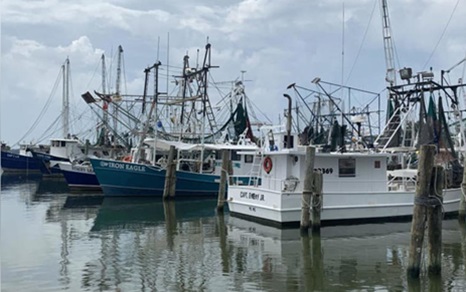
Seafood industry groups unite to oppose bill that would limit bottom trawls
A bill introduced last month in the U.S. House of Representatives that could place limits on trawling by fishermen and shrimpers is drawing the fire of seafood industry groups from Alaska to Florida. House Resolution 8507, the Bottom Trawl Clarity Act, would require the nation’s eight regional Fisheries Management councils, some of which allow fishing trawls to scrape the bottom, to define the terms “substantial” versus “limited” contact of the bottom. The bill is authored by U.S. Rep. Mary Peltola, D-Alaska, who said in a summary of the legislation that “limiting the areas where bottom trawling is allowed will help enhance marine health, diversity, and resilience, strengthening the ocean ecosystem that Alaska fishermen depend on.” more, >>CLICK TO READ<< 16:15
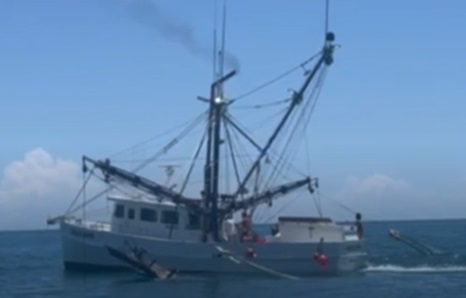
North Carolina: Debates over ending inshore trawling to protect marine life
For commercial fishermen like Thomas Smith, who works in the Pamlico Sound, shrimp trawling is essential for their livelihood. “Most of our income comes between July and November while working on inshore waters,” says Smith. He said that keeping shrimp trawling operations only in the ocean would only be viable for about two months each year, potentially devastating his business. “It would put me out of business,” he adds. Tim Gestwicki, CEO of the NCWF, supports ocean shrimp trawling but insists that inshore trawling must be stopped to protect juvenile fish species, such as the Southern flounder. “It’s time for us to catch up with the times and quit squandering our resources unnecessarily,” said Gestwicki. Video, more, >>CLICK TO READ<< 09:37
Inside the Slimy, Smelly, Secretive World of Glass-Eel Fishing
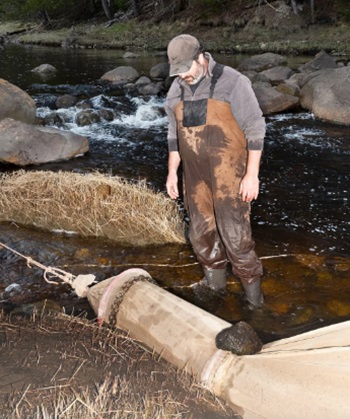 The Sargasso Sea, a warm, calm expanse of the North Atlantic Ocean, is bordered not by land but by four strong currents—a gyre. Vast mats of prickly brown seaweed float so thickly on the windless surface that Christopher Columbus worried about his ships getting stuck. The biodiverse sanctuary within and beneath the sargassum produces Anguilla rostrata, the American eel. Each female lays some eight million eggs. The eggs hatch as ribbonlike larvae that drift to the Gulf Stream, which carries them to the continental shelf. By the time they reach Maine, the larvae have transformed into swimmers about the length of an index finger, with the circumference of a bean sprout and the translucence of a jellyfish. Hence their nickname, glass eels, also known as elvers. The glass eel is barely visible, but for a dark stripe—its developing backbone—and a couple of chia seeds for eyes. “Ghosts on the water,” a Maine fisherman once called them. Travelling almost as one, like a swarm or a murmuration, glass eels enter tidal rivers and push upstream, pursuing the scent of freshwater until, ideally, they reach a pond and commence a long, tranquil life of bottom-feeding. more, >>CLICK TO READ<< 10:50
The Sargasso Sea, a warm, calm expanse of the North Atlantic Ocean, is bordered not by land but by four strong currents—a gyre. Vast mats of prickly brown seaweed float so thickly on the windless surface that Christopher Columbus worried about his ships getting stuck. The biodiverse sanctuary within and beneath the sargassum produces Anguilla rostrata, the American eel. Each female lays some eight million eggs. The eggs hatch as ribbonlike larvae that drift to the Gulf Stream, which carries them to the continental shelf. By the time they reach Maine, the larvae have transformed into swimmers about the length of an index finger, with the circumference of a bean sprout and the translucence of a jellyfish. Hence their nickname, glass eels, also known as elvers. The glass eel is barely visible, but for a dark stripe—its developing backbone—and a couple of chia seeds for eyes. “Ghosts on the water,” a Maine fisherman once called them. Travelling almost as one, like a swarm or a murmuration, glass eels enter tidal rivers and push upstream, pursuing the scent of freshwater until, ideally, they reach a pond and commence a long, tranquil life of bottom-feeding. more, >>CLICK TO READ<< 10:50
$3 million Shem Creek dock renovations aim to boost shrimping, fishing fleet
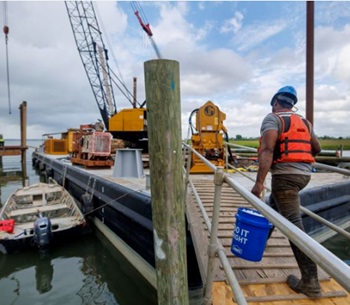 In a show of support for the longstanding shrimping industry, the Shem Creek docks are undergoing major renovations. The $3 million repair and rebuild of the dock, pier and processing building on Haddrell Street began June 11. Construction for the project was awarded to Cape Romain Contractors in April. Crews will remove and rebuild the existing boardwalk and pier to create a wider walking clearance for shrimpers and improve accessibility for workers and visitors. The shrimp docks are not the same as the boardwalk at Shem Creek Park and are tucked away from the restaurants and nightlife that surround the creek. Crews will also repair the shrimp processing section of the building where Tarvin Seafood operates. The back portion of the building has been condemned for years and is unsafe, said Cindy Tarvin, owner of the family-operated business. Photos, more, >>CLICK TO READ<< 09:13
In a show of support for the longstanding shrimping industry, the Shem Creek docks are undergoing major renovations. The $3 million repair and rebuild of the dock, pier and processing building on Haddrell Street began June 11. Construction for the project was awarded to Cape Romain Contractors in April. Crews will remove and rebuild the existing boardwalk and pier to create a wider walking clearance for shrimpers and improve accessibility for workers and visitors. The shrimp docks are not the same as the boardwalk at Shem Creek Park and are tucked away from the restaurants and nightlife that surround the creek. Crews will also repair the shrimp processing section of the building where Tarvin Seafood operates. The back portion of the building has been condemned for years and is unsafe, said Cindy Tarvin, owner of the family-operated business. Photos, more, >>CLICK TO READ<< 09:13
Georgia food shrimp harvest season opens June 18
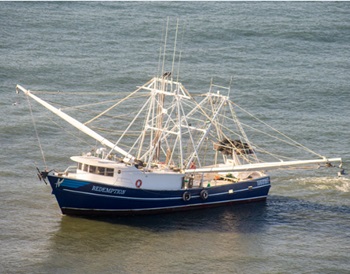 Georgia’s 2024 commercial and recreational food shrimp season will open in state waters at 8 a.m. Tuesday, June 18, 2024. The opening applies to Georgia’s territorial waters from shore to three nautical miles offshore. Data from CRD’s Ecological Monitoring Trawl Survey, which monitors shrimp populations year-round, showed the fishery in May was producing higher numbers of shrimp over the 5-year average, although their sizes were negligibly smaller than shrimp from the same period. more, >>CLICK TO READ<< 06:59
Georgia’s 2024 commercial and recreational food shrimp season will open in state waters at 8 a.m. Tuesday, June 18, 2024. The opening applies to Georgia’s territorial waters from shore to three nautical miles offshore. Data from CRD’s Ecological Monitoring Trawl Survey, which monitors shrimp populations year-round, showed the fishery in May was producing higher numbers of shrimp over the 5-year average, although their sizes were negligibly smaller than shrimp from the same period. more, >>CLICK TO READ<< 06:59






